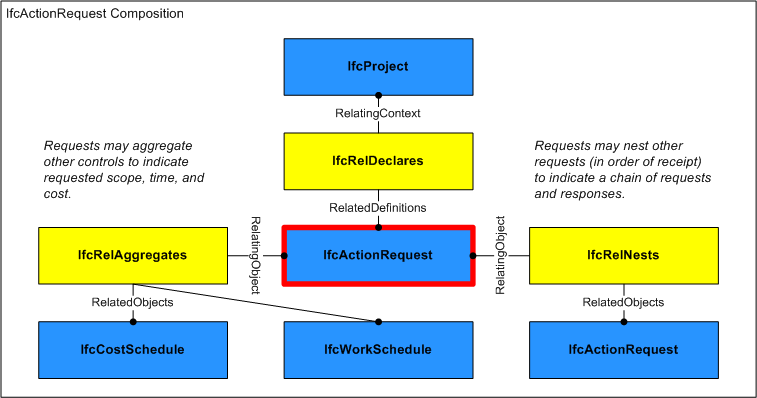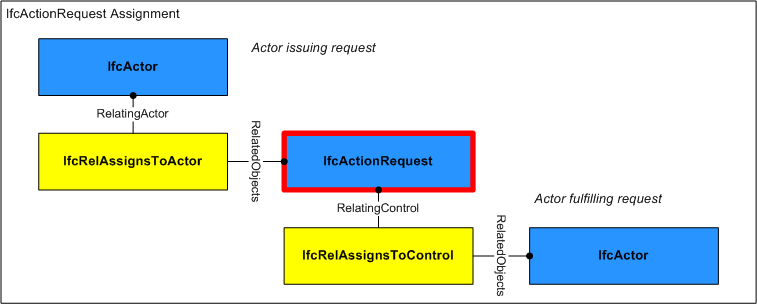6.5.3.1 IfcActionRequest
6.5.3.1.1 Semantic definition
A request is the act or instance of asking for something, such as a request for information, bid submission, or performance of work.
Requests may take many forms depending on the need including fault reports for maintenance, requests for small works, and purchase requests (where these are to be made through a help desk or buying function).
6.5.3.1.2 Entity inheritance
6.5.3.1.3 Attributes
| # | Attribute | Type | Description |
|---|---|---|---|
| IfcRoot (4) | |||
| 1 | GlobalId | IfcGloballyUniqueId |
Assignment of a globally unique identifier within the entire software world. |
| 2 | OwnerHistory | OPTIONAL IfcOwnerHistory |
Assignment of the information about the current ownership of that object, including owning actor, application, local identification and information captured about the recent changes of the object. |
| 3 | Name | OPTIONAL IfcLabel |
An optional name for use by the participating software systems or users. For some subtypes of IfcRoot the insertion of the Name attribute may be required. This would be enforced by a where rule. |
| 4 | Description | OPTIONAL IfcText |
An optional description, provided to exchange informative comments. |
| IfcObjectDefinition (7) | |||
| HasAssignments | SET [0:?] OF IfcRelAssigns FOR RelatedObjects |
Reference to the relationship objects, that assign (by an association relationship) other subtypes of IfcObject to this object instance. Examples are the association to products, processes, controls, resources or groups. |
|
| Nests | SET [0:1] OF IfcRelNests FOR RelatedObjects |
References to the decomposition relationship being a nesting. It determines that this object definition is a part within an ordered whole/part decomposition relationship. An object occurrence or type can only be part of a single decomposition (to allow hierarchical structures only). |
|
| IsNestedBy | SET [0:?] OF IfcRelNests FOR RelatingObject |
References to the decomposition relationship being a nesting. It determines that this object definition is the whole within an ordered whole/part decomposition relationship. An object or object type can be nested by several other objects (occurrences or types). |
|
| HasContext | SET [0:1] OF IfcRelDeclares FOR RelatedDefinitions |
References to the context providing context information such as project unit or representation context. It should only be asserted for the uppermost non-spatial object. |
|
| IsDecomposedBy | SET [0:?] OF IfcRelAggregates FOR RelatingObject |
References to the decomposition relationship being an aggregation. It determines that this object definition is the whole within an unordered whole/part decomposition relationship. An object definition can be aggregated by several other objects (occurrences or parts). |
|
| Decomposes | SET [0:1] OF IfcRelAggregates FOR RelatedObjects |
References to the decomposition relationship being an aggregation. It determines that this object definition is a part within an unordered whole/part decomposition relationship. An object definition can only be part of a single decomposition (to allow hierarchical structures only). |
|
| HasAssociations | SET [0:?] OF IfcRelAssociates FOR RelatedObjects |
Reference to the relationship objects, that associates external references or other resource definitions to the object. Examples are the association to library, documentation or classification. |
|
| IfcObject (5) | |||
| 5 | ObjectType | OPTIONAL IfcLabel |
The type denotes a particular type that indicates the object further. The use has to be established at the level of instantiable subtypes. In particular it holds the user defined type, if the enumeration of the attribute PredefinedType is set to USERDEFINED or when the concrete entity instantiated does not have a PredefinedType attribute. The latter is the case in some exceptional leaf classes and when instantiating IfcBuiltElement directly. |
| IsDeclaredBy | SET [0:1] OF IfcRelDefinesByObject FOR RelatedObjects |
Link to the relationship object pointing to the declaring object that provides the object definitions for this object occurrence. The declaring object has to be part of an object type decomposition. The associated IfcObject, or its subtypes, contains the specific information (as part of a type, or style, definition), that is common to all reflected instances of the declaring IfcObject, or its subtypes. |
|
| Declares | SET [0:?] OF IfcRelDefinesByObject FOR RelatingObject |
Link to the relationship object pointing to the reflected object(s) that receives the object definitions. The reflected object has to be part of an object occurrence decomposition. The associated IfcObject, or its subtypes, provides the specific information (as part of a type, or style, definition), that is common to all reflected instances of the declaring IfcObject, or its subtypes. |
|
| IsTypedBy | SET [0:1] OF IfcRelDefinesByType FOR RelatedObjects |
Set of relationships to the object type that provides the type definitions for this object occurrence. The then associated IfcTypeObject, or its subtypes, contains the specific information (or type, or style), that is common to all instances of IfcObject, or its subtypes, referring to the same type. |
|
| IsDefinedBy | SET [0:?] OF IfcRelDefinesByProperties FOR RelatedObjects |
Set of relationships to property set definitions attached to this object. Those statically or dynamically defined properties contain alphanumeric information content that further defines the object. |
|
| IfcControl (2) | |||
| 6 | Identification | OPTIONAL IfcIdentifier |
An identifying designation given to a control It is the identifier at the occurrence level. |
| Controls | SET [0:?] OF IfcRelAssignsToControl FOR RelatingControl |
Reference to the relationship that associates the control to the object(s) being controlled. |
|
| Click to show 18 hidden inherited attributes Click to hide 18 inherited attributes | |||
| IfcActionRequest (3) | |||
| 7 | PredefinedType | OPTIONAL IfcActionRequestTypeEnum |
Identifies the predefined type of sources through which a request can be made. |
| 8 | Status | OPTIONAL IfcLabel |
The status currently assigned to the request. Possible values include: Hold: wait to see if further requests are received before deciding on action NoAction: no action is required on this request Schedule: plan action to take place as part of maintenance or other task planning/scheduling Urgent: take action immediately |
| 9 | LongDescription | OPTIONAL IfcText |
Detailed description of the permit. |
6.5.3.1.4 Property sets
-
Pset_ActionRequest
- RequestSourceLabel
- RequestSourceName
- RequestComments
6.5.3.1.5 Concept usage
| Concept | Usage | Description | |
|---|---|---|---|
| IfcRoot (2) | |||
| Revision Control | General |
Ownership, history, and merge state is captured using IfcOwnerHistory. |
|
| Software Identity | General |
IfcRoot assigns the globally unique ID. In addition, it may also provide a name and description for the concept. |
|
| IfcObjectDefinition (9) | |||
| Classification Association | General |
Any object occurrence or object type can have a reference to a specific classification reference, i.e. to a particular facet within a classification system. |
|
| Aggregation | General |
No description available. |
|
| Approval Association | General |
No description available. |
|
| Constraint Association | General |
No description available. |
|
| Document Association | General |
No description available. |
|
| Library Association | General |
No description available. |
|
| Material Association | General |
No description available. |
|
| Material Single | General |
No description available. |
|
| Nesting | General |
No description available. |
|
| IfcObject (5) | |||
| Object Predefined Type | General |
No description available. |
|
| Object Typing | General |
Any object occurrence can be typed by being assigned to a common object type utilizing this concept. A particular rule, restricting the applicable subtypes of IfcTypeObject that can be assigned, is introduced by overriding this concept at the level of subtypes of IfcObject. This concept can be applied to the following resources: |
|
| Object User Identity | General |
An attribute Name and optionally Description can be used for all subypes of IfcObject. For those subtypes, that have an object type definition, such as IfcBeam - IfcBeamType, the common Name and optionally Description is associated with the object type. |
|
| Property Sets with Override | General |
Any object occurrence can hold property sets, either directly at the object occurrence as element specific property sets, or at the object type, as type property sets. In this case, the properties that are provided to the object occurrence are the combinations of element specific and type properties. In case that the same property (within the same property set) is defined both in occurrence and type properties, the property value of the occurrence property overrides the property value of the type property. |
|
| Assignment to Group | General |
No description available. |
|
| IfcControl (1) | |||
| Control Assignment | General |
Controls have assignments from products, processes, or other objects by using the relationship object IfcRelAssignsToControl. This concept can be applied to the following resources: |
|
| Click to show 17 hidden inherited concepts Click to hide 17 inherited concepts | |||
| IfcActionRequest (5) | |||
| Aggregation | General |
As shown in Figure 6.5.3.1.A, an IfcActionRequest may be aggregated into components.  |
|
| Approval Association | General |
Approvals may be associated to indicate the status of acceptance or rejection using the IfcRelAssociatesApproval relationship where RelatingApproval refers to an IfcApproval and RelatedObjects contains the IfcActionRequest. Approvals may be split into sub-approvals using IfcApprovalRelationship to track approval status separately for each party where RelatingApproval refers to the higher-level approval and RelatedApprovals contains one or more lower-level approvals. The hierarchy of approvals implies sequencing such that a higher-level approval is not executed until all of its lower-level approvals have been accepted. |
|
| Control Assignment | General |
As shown in Figure 6.5.3.1.B, an IfcActionRequest may be assigned to the following entities using relationships as indicated:
The IfcActionRequest may have assignments of its own using the IfcRelAssignsToControl relationship where RelatingControl refers to the IfcActionRequest and RelatedObjects contains one or more objects of the following types:
 This concept can be applied to the following resources: |
|
| Object Nesting | General |
This concept can be applied to the following resources:
|
|
| Property Sets for Objects | General |
This concept can be applied to the following resources: |
|
6.5.3.1.6 Formal representation
ENTITY IfcActionRequest
SUBTYPE OF (IfcControl);
PredefinedType : OPTIONAL IfcActionRequestTypeEnum;
Status : OPTIONAL IfcLabel;
LongDescription : OPTIONAL IfcText;
END_ENTITY;